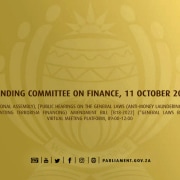|
Getting your Trinity Audio player ready...
|
In its 2021/2022 annual report, released at the end of September 2022, the Financial Intelligence Centre (FIC) noted that it achieved 17 of its 19 performance goals – and exceeded 10 of the 17. One of these was to contribute to the recovery of stolen money in a way that exceeded its previous achievement.
This it did handsomely, contributing to the recovery of over R5-billion in criminal proceeds. According to the FIC, this is a “a considerable increase in comparison to the R3.3-billion recovered in the previous year.”
The entity attributed various factors to its good-news accomplishment, including partnerships and collaboration with a wide range of national and international role players, the use of technology to monitor compliance, and the production of 3 114 intelligence reports during the year in review. Of these, 2 300 were reactive and 782 proactive reports, while 32 were on illicit financial flows.
The FIC also noted an increase in the uptake and use of this financial intelligence information.
“This higher utilisation of our intelligence augurs well for the future and we are particularly pleased about this,” said the entity. “The focus on following the money flows is critical in uncovering individual and syndicated crimes.”
Collaboration an important factor
The wide range of players with which the FIC partnered and collaborated in fighting financial crime is a crucial factor in its success. These engagements are important in maximising the FIC’s ability to collect transactional and other information that is reliable, useful, accurate, comprehensive, timeous and up to date. In addition, regular collaboration allows the FIC to reciprocate and speedily share quality information with its partners.
The FIC named some of its key collaborative partners, which include:
- Domestic government institutions such as the South African Revenue Service, the South African Reserve Bank, law enforcement and prosecutorial authorities, and other investigative agencies.
- Global bodies such as the Egmont Group of Financial Intelligence Units and the Financial Action Task Force.
- The Inter-Agency Working Group on Illicit Financial Flows.
- The Eastern and Southern Africa Anti-Money Laundering Group/
- The Intergovernmental Fintech Working Group.
During the financial year the centre entered into memoranda of understanding (MoUs) with six domestic institutions, bringing the total number of signed MoUs to 38. The new partners are the National Credit Regulator, the National Consumer Commission, the Electoral Commission of South Africa, the Department of Social Development, the Department of Planning, Monitoring and Evaluation, and the KwaZulu-Natal Gaming and Betting Board.
“These MoUs commit both parties to working together to ensure that the financial system is safe, stable and sustainable for all citizens.”
The FIC also has MoUs with 96 financial intelligence units across the globe.
Compliance with FIC regulations
The FIC, working with supervisory bodies, conducts its compliance inspections in terms of section 45B of the FIC Act, to assess the level of institutions’ compliance with the Act.
In 2021/2022, said the organisation, supervisory bodies issued 739 inspection reports compared to 368 in 2020/2021, while the FIC issued 404 inspection reports, compared to last year’s 381. Furthermore, the FIC issued 27 sanctions for non-compliance, while supervisory bodies issued 10. These sanctions may take the form of a caution or a reprimand, or a financial penalty of up to R10-million, among others.
The total financial value of the sanctions was R41 680 646.76. Seven of the 37 were appealed, and the sanctions not appealed were valued at R28 140 646.76. Among the latter offenders were Randburg Coin, the Gold Reef City Mint, and a number of car traders.
Sanctions mostly related to a failure to register/timeously register with the FIC, or a failure to report/timeously report report cash transactions in excess of the threshold of R24 999.00.
Reporting to the FIC
A total of 45 555 reporting entities registered with the FIC submitted more than 5.12-million regulatory reports during 2021/22. Of these, 4 589 703 were cash threshold reports.
The organisation received 533 277 reports of suspicious and unusual transactions – this represents an increase of 35% over the previous year.
In addition, four terrorist property reports were received during the reporting period.








